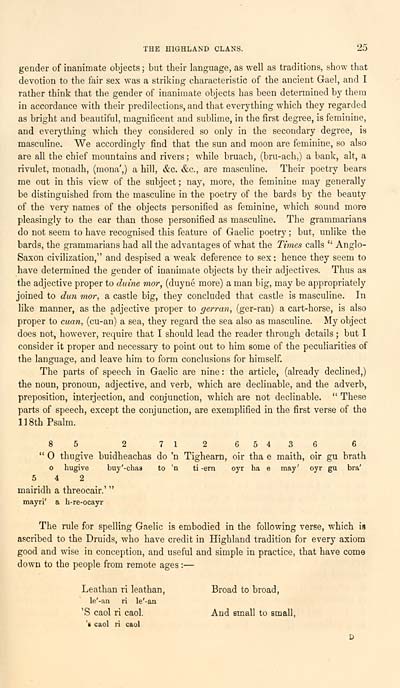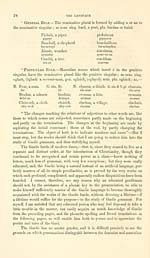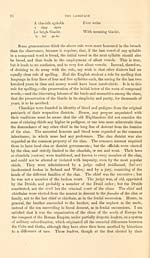Download files
Complete book:
Individual page:
Thumbnail gallery: Grid view | List view

THE HIGHLAND CLANS. 25
gender of inanimate objects ; but their language, as well as traditions, show that
devotion to the fair sex was a striking characteristic of the ancient Gael, and I
rather think that the gender of inanimate objects has been determined by them
in accordance with their predilections, and that everything which they regarded
as bright and beautiful, magnificent and sublime, in the first degree, is feminine,
and everything which they considered so only in the secondary degree, is
masculine. We accordingly find that the sun and moon are feminine, so also
are all the chief mountains and rivers ; while bruach, (bru-ach,) a bank, alt, a
rivulet, monadh, (mona',) a hill, &c. &c., are masculine. Their poetry bears
me out in this view of the subject ; nay, more, the feminine may generally
be distinguished from the masculine in the poetry of the bards by the beauty
of the very names of the objects personified as feminine, which sound more
pleasingly to the ear than those personified as masculine. The grammarians
do not seem to have recognised this feature of Gaelic poetry ; but, unlike the
bards, the grammarians had all the advantages of what the Times calls " Anglo-
Saxon civilization," and despised a w-eak deference to sex: hence they seem to
have determined the gender of inanimate objects by their adjectives. Thus as
the adjective proper to duine mor, (duyne more) a man big, may be appropriately
joined to dun mor, a castle big, they concluded that castle is masculine. In
like manner, as the adjective proper to gerran, (ger-ran) a cart-horse, is also
proper to cuan, (cu-an) a sea, they regard the sea also as masculine. My object
does not, however, require that I should lead the reader through details ; but I
consider it proper and necessary to point out to him some of the peculiarities of
the language, and leave him to form conclusions for himself.
The parts of speech in Gaelic are nine : the article, (already declined,)
the noun, pronoun, adjective, and verb, which are declinable, and the adverb,
preposition, interjection, and conjunction, which are not declinable. " These
parts of speech, except the conjunction, are exemplified in the first verse of the
118th Psalm.
85 2 712 65436 6
" thugive buidheachas do 'n Tighearn, oir tha e raaith, oir gu brath
o hugive buy'-chaa to 'n ti -em oyr ha e may' oyr gu bra'
5 4 2
mairidh a threocair.' "
mayri' a h-re-ocayr
The rule for spelling Gaelic is embodied in the following verse, which is
ascribed to the Druids, who have credit in Highland tradition for every axiom
good and wise in conception, and useful and simple in practice, that have come
down to the people from remote ages : —
Leathan ri leathan. Broad to broad,
le'-an ri le'-an
'S caol ri caol. And small to small,
'i caol ri caol
gender of inanimate objects ; but their language, as well as traditions, show that
devotion to the fair sex was a striking characteristic of the ancient Gael, and I
rather think that the gender of inanimate objects has been determined by them
in accordance with their predilections, and that everything which they regarded
as bright and beautiful, magnificent and sublime, in the first degree, is feminine,
and everything which they considered so only in the secondary degree, is
masculine. We accordingly find that the sun and moon are feminine, so also
are all the chief mountains and rivers ; while bruach, (bru-ach,) a bank, alt, a
rivulet, monadh, (mona',) a hill, &c. &c., are masculine. Their poetry bears
me out in this view of the subject ; nay, more, the feminine may generally
be distinguished from the masculine in the poetry of the bards by the beauty
of the very names of the objects personified as feminine, which sound more
pleasingly to the ear than those personified as masculine. The grammarians
do not seem to have recognised this feature of Gaelic poetry ; but, unlike the
bards, the grammarians had all the advantages of what the Times calls " Anglo-
Saxon civilization," and despised a w-eak deference to sex: hence they seem to
have determined the gender of inanimate objects by their adjectives. Thus as
the adjective proper to duine mor, (duyne more) a man big, may be appropriately
joined to dun mor, a castle big, they concluded that castle is masculine. In
like manner, as the adjective proper to gerran, (ger-ran) a cart-horse, is also
proper to cuan, (cu-an) a sea, they regard the sea also as masculine. My object
does not, however, require that I should lead the reader through details ; but I
consider it proper and necessary to point out to him some of the peculiarities of
the language, and leave him to form conclusions for himself.
The parts of speech in Gaelic are nine : the article, (already declined,)
the noun, pronoun, adjective, and verb, which are declinable, and the adverb,
preposition, interjection, and conjunction, which are not declinable. " These
parts of speech, except the conjunction, are exemplified in the first verse of the
118th Psalm.
85 2 712 65436 6
" thugive buidheachas do 'n Tighearn, oir tha e raaith, oir gu brath
o hugive buy'-chaa to 'n ti -em oyr ha e may' oyr gu bra'
5 4 2
mairidh a threocair.' "
mayri' a h-re-ocayr
The rule for spelling Gaelic is embodied in the following verse, which is
ascribed to the Druids, who have credit in Highland tradition for every axiom
good and wise in conception, and useful and simple in practice, that have come
down to the people from remote ages : —
Leathan ri leathan. Broad to broad,
le'-an ri le'-an
'S caol ri caol. And small to small,
'i caol ri caol
Set display mode to: Large image | Transcription
Images and transcriptions on this page, including medium image downloads, may be used under the Creative Commons Attribution 4.0 International Licence unless otherwise stated. ![]()
| Early Gaelic Book Collections > Blair Collection > Treatise on the language, poetry, and music of the Highland clans > (37) |
|---|
| Permanent URL | https://digital.nls.uk/76236810 |
|---|
| Description | A selection of books from a collection of more than 500 titles, mostly on religious and literary topics. Also includes some material dealing with other Celtic languages and societies. Collection created towards the end of the 19th century by Lady Evelyn Stewart Murray. |
|---|
| Description | Selected items from five 'Special and Named Printed Collections'. Includes books in Gaelic and other Celtic languages, works about the Gaels, their languages, literature, culture and history. |
|---|

